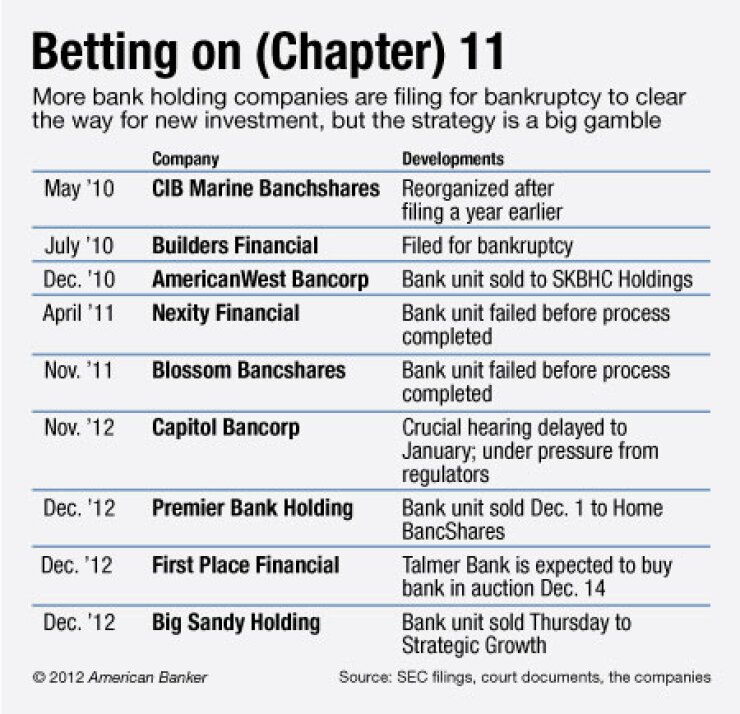-
Capitol Bancorp had to postpone a bankruptcy hearing because, it says, the Federal Deposit Insurance Corp. repeatedly blocked it from paying the due-diligence costs of its new investors.
December 6 -
With the failed-bank market drying up, Midwestern consolidator Talmer enters a stalking-horse bid for a small Ohio bank burdened by debts to the U.S. government and trust-preferred holders.
October 29 -
To satisfy creditors, Big Sandy Holding's bankruptcy plan, filed on Thursday, calls for an auction of its $840 million-asset unit, Mile High Banks.
September 28 -
Home BancShares, in Conway, Ark., has agreed to pay $1.4 million for Premier Bank in Tallahassee, Fla. Premier's parent is in bankruptcy proceedings, which could spur rival bids for Premier.
August 15 -
AmericanWest in Spokane, Wash., announced Thursday it plans to acquire the $221 million-asset Inland Community Bank for $23.7 million, or 95% of its book value. It is AmericanWest's third acquisition in California in a year.
July 19

More banks are finding new life in bankruptcy court, and more buyers are lining up to be their saviors.
The auctions of
There has been plenty of buzz about banks' use of bankruptcy to solve their problems, but success stories were rare.
AmericanWest Bank in Spokane, Wash., has been the beacon of hope. It was sold to SKBHC Holdings in late 2010 and has since
"We expected more activity right after AmericanWest than we saw, but there is definitely more now," says Van C. Durrer 2nd, a partner at Skadden, Arps, Slate, Meagher & Flom.
As the method, which allows a bank to be separated from its debt-addled holding company, gains popularity, the auction process will become more competitive, Durrer says.
"I predict that as it becomes more well-known, more sophisticated parties will get involved, and it will be harder to pick these off cheap," Durrer says. "Initially some of the regional banks would just sit back and wait and were maybe waiting for failures. But I think they are paying more attention."
The Mile High Banks sale, in that regard, may be a harbinger.
The initial bidder, and ultimate buyer, was Strategic Growth Bancorp, a bank roll-up group from El Paso, Texas.
However, observers in the Denver area predicted in October that other bidders would emerge given the appeal of the market. One did; court documents from the bankruptcy of Big Sandy Holding, the parent of Mile High, show an unnamed party placed a bid. Several sources say the bidder was a larger community bank in the Midwest but declined to share its name.
Strategic Growth's initial bid was $5.5 million for the $840 million-asset Mile High Banks and its final bid was $1.5 million up front, with the creditors expected to get as much as $6 million from an income-tax refund due to the bank. Strategic is also expected to inject $90 million into the ailing bank, which is significantly undercapitalized.
Strategic Growth officials declined to comment. Meanwhile, the company also announced last week it would acquire the $755 million-asset New Mexico Banquest in Santa Fe.
Multiple bids can make the bankruptcy process smoother. Holders of trust-preferred securities tried to delay the AmericanWest proceedings in 2010 because they wanted to see if SKBHC's $6.5 million bid could be bested.
Last month the Treasury Department tried to delay the auction of First Place Bank to allow more time for other bidders. The bank's parent, First Place Financial (FPFCQ), issued $73 million of equity to Treasury as part of the Troubled Asset Relief Program in 2009. The judge denied the request to push back the sale, but
Capitol Bancorp, in Lansing, Mich., is also in the midst of a recapitalization through bankruptcy. Its deal, however, does not involve the sale of any banks, but rather the restructuring of its capital to allow new investors to enter.





